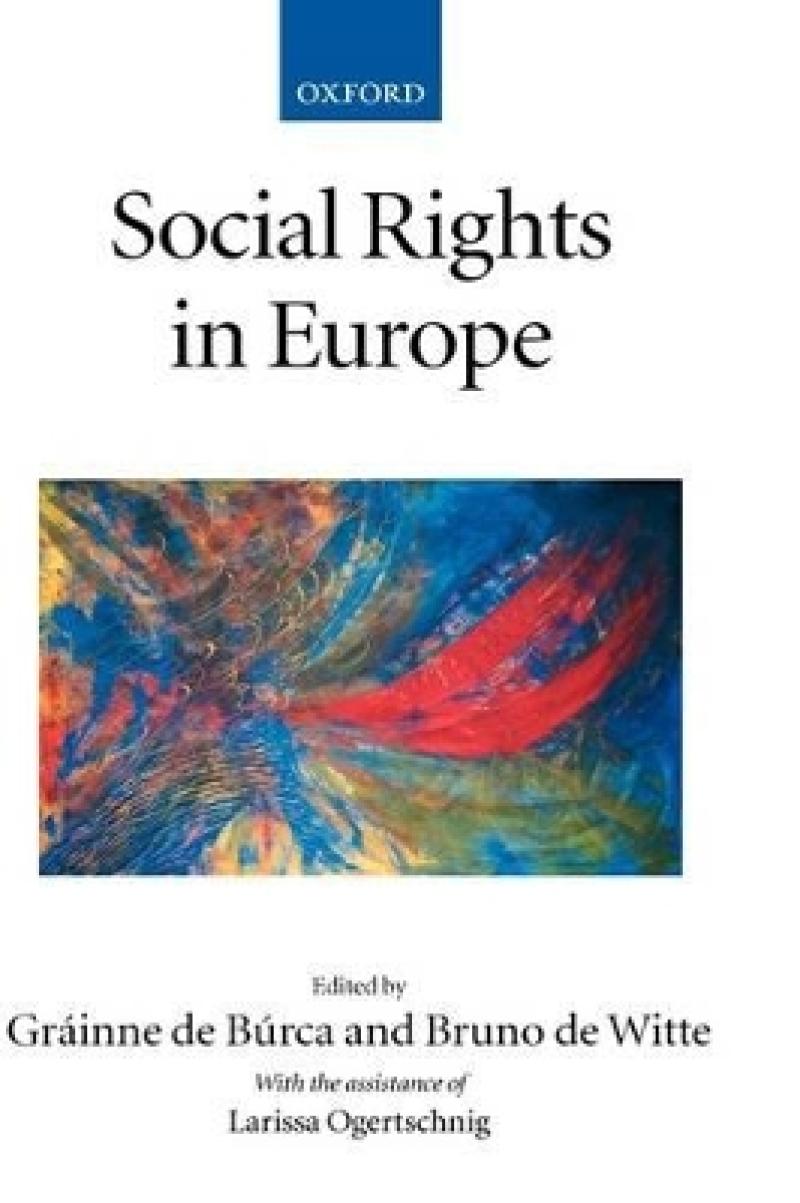Social rights, while traditionally the neglected sibling within the human rights family, have been prominent on the agenda in Europe in recent years. The debate over the justiciability of social rights in the EU's Charter of Fundamental Rights, and the revision of the Council of Europe's European Social Charter, have contributed in different ways to this prominence. The chapters in this book examine these recent developments, and discuss some of the current dilemmas and challenges for the system of protection of social rights in Europe.
The collection moves deliberately beyond the traditional focus on labour rights to consider other social rights which are seen to be of growing importance, such as health and disability in particular. Writers who are familiar with, and in some cases who have worked within, the various European systems assess different aspects of their functioning, including their respective mechanisms for monitoring and enforcement. The relationship between the two main systems of protection of social rights (The EU Charter of Fundamental Rights and the European Social Charter) is considered both in a chapter on the possibility for future accession of the EU to the ESC, as well as through a series of case studies on the right to work, to health, to freedom from discrimination, and the rights of the disabled. This approach allows reflection on the respective strengths and weaknesses of these two systems, and the existing tensions and synergies between them.
Les mer
Concerned with the legal framework for protecting and promoting social rights in Europe. This book contains chapters that examine procedural and substantive aspects of the Council of Europe's European Social Charter, and the European Union's Charter of Fundamental Rights, as well as the EU's so-called 'acquis' in the area of social rights.
Les mer
I; II THE EUROPEAN SOCIAL CHARTER; III THE EUROPEAN UNION; IV ESC JURISPRUDENCE AND THE EU ACQUIS: THE COMMON CORE AND THE ADDED VALUE?; V BEYOND EUROPE'S BORDERS
Considers so-called 'neglected rights' such as those relating to health and disability
Covers both the EU Charter of Fundamental Rights and European Social Charter, two systems rarely considered side by side in the academic literature
Situates the debate on social rights in the context of important current events in the EU, including the EU Constitution, the recent Open Method of Coordination, economic globalization, and Europe's increasing international role
Contrasts protection of social rights between traditionally democratic and post-communist states
Les mer
Gráinne de Búrca has been professor of European Union Law at the European University Institute since 1998. Prior to that she was a lecturer in law at Oxford University and fellow of Somerville College from 1990-1998. She has been a visiting professor at the Universities of Toronto, Michigan, Columbia and NYU. Her field of expertise is broadly in EU law, with particular focus on constitutional issues of European integration, EU human rights policy and
European and transnational governance. She is co-director of the EUI's Academy of European Law and series co-editor of two OUP book series: Oxford Studies in European Law, and the Collected Courses of the Academy of
European Law. She is co-author with Paul Craig of the textbook EU Law, currently in its third edition.; Larissa Ogertschnig is researcher in the Department of Law at the European University Institute where she is currently completing her PhD on EU Democracy Assistance to the states of the former Soviet Union. She holds a law degree from the University of Vienna and a Diploma in International Studies from the Paul H. Nitze School of Advanced International Studies - Johns Hopkins University,
Bologna Center. She has worked with governmental and non-governmental organizations in the field of university reform in several states of Central Asia and was stagiaire in the Delegation of the European
Commission in the Ukraine. Her research interests are in the field of EU external relations, human rights and democratization. Bruno de Witte has been professor of European Union Law at the European University Institute in Florence since 2000. Prior to that he was a professor of EU law at Maastricht University in the Netherlands. He is co-director of the EUI's Academy of European Law and series co-editor of the OUP book series: Collected Courses of the Academy of European Law. His main fields
of research are the constitutional law of the European Union and legal issues of cultural diversity, language regulation and minority protection in Europe.
Les mer
Considers so-called 'neglected rights' such as those relating to health and disability
Covers both the EU Charter of Fundamental Rights and European Social Charter, two systems rarely considered side by side in the academic literature
Situates the debate on social rights in the context of important current events in the EU, including the EU Constitution, the recent Open Method of Coordination, economic globalization, and Europe's increasing international role
Contrasts protection of social rights between traditionally democratic and post-communist states
Les mer
Produktdetaljer
ISBN
9780199286171
Publisert
2005
Utgiver
Vendor
Oxford University Press
Vekt
1 gr
Høyde
241 mm
Bredde
163 mm
Dybde
30 mm
Aldersnivå
P, 06
Språk
Product language
Engelsk
Format
Product format
Innbundet
Antall sider
440
Associate editor
